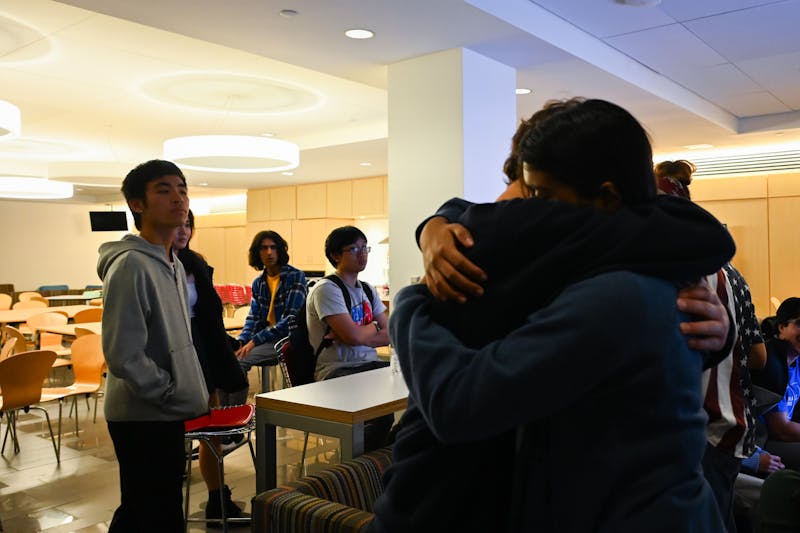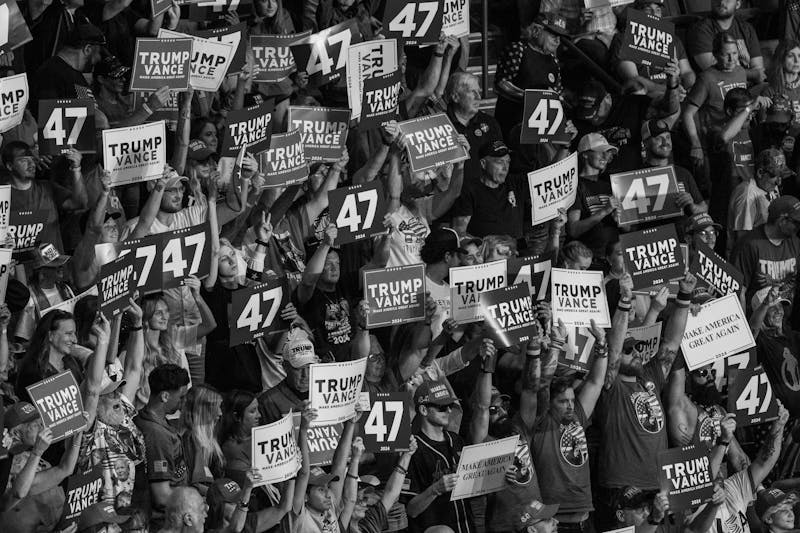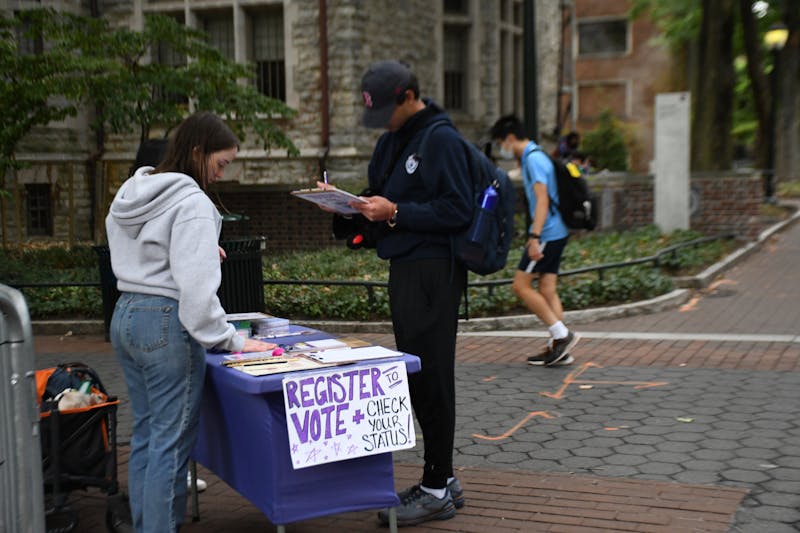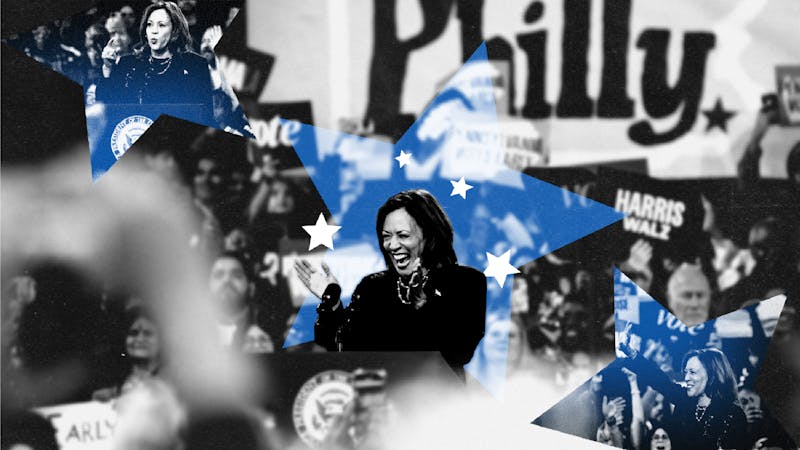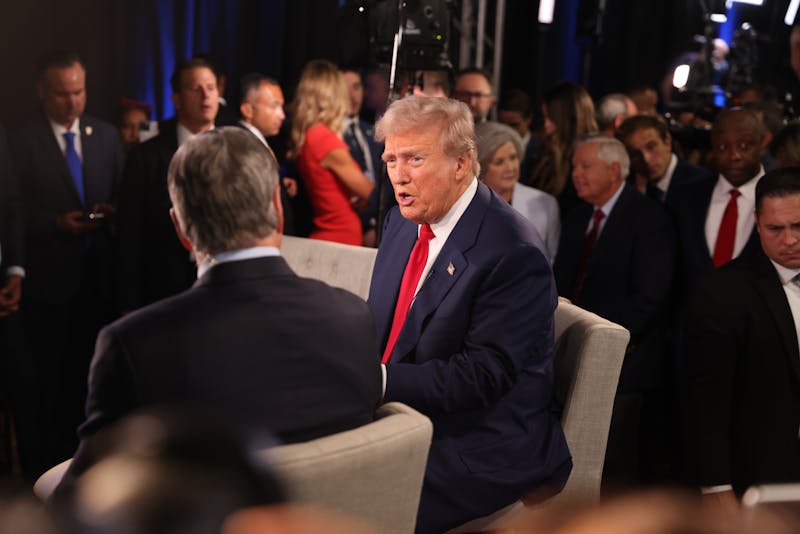
As the country headed into Election Day on Nov. 5, it was clear that the victor of the race in Pennsylvania would be a tossup between then-former President Donald Trump and Vice President Kamala Harris.
What wasn't so clear was the degree to which Philadelphia and University City — although still two deep-blue bastions of Democratic support — would end up shifting to the right.
Harris secured 81.6% of Election Day votes for president on Penn's campus, generally in line with how Philadelphia voted at large — but representing a decrease from how President Joe Biden and former Democratic presidential nominee Hillary Clinton fared on campus in 2020 and 2016, respectively.
The Daily Pennsylvanian spoke with several conservative Penn students about their thoughts on the shift and their experiences amid a liberal University climate.
On the campaign trail, Trump has long touted the existence of his “silent majority” to describe the discreet yet strong support of his followers. The Nov. 5 election returns — which saw 16% of on-campus votes go to Trump — raise the question of whether a contingent of the 1968 Wharton graduate's “silent majority” exists at his alma mater, and why students who support the president-elect feel reluctant to express their opinions openly.
College senior Isabella Corman, who said that her viewpoints "align more with conservative ideologies," said that she was surprised upon seeing the size of Penn's Trump-voting contingent on in the election.
“I think that was a trend that not many people expected,” Corman said.
Though issues like abortion and threats to democracy remained top concerns for Penn students approaching the election, The Daily Pennsylvanian's voter survey found that inflation and cost of living were the primary issues for Republican students.
College junior and Penn College Republicans President Peter Kapp wrote in a statement to the DP that Trump’s initiatives that create and protect jobs, border security, and a simplified tax system were ways the president-elect “has demonstrated commitment to the American people.”
“While President Trump was not my initial choice in the Republican primaries, and I do not align with all of his goals or beliefs, I saw him as the candidate best positioned to foster a thriving economy, project strength on the global stage, and prioritize American interests,” Kapp wrote.
Wharton first year Jacques Papescu, who said that he was not able to vote during this year’s election cycle, said that he would have voted for Trump, listing economic, social, and national security issues as his priorities.
Corman said she "admired" the conservative values of Republican United States Senate candidate Dave McCormick during this election cycle, highlighting foreign policy and border security as issues important to her.
Although the students said they remained steadfast in their conservative beliefs or support for Trump, they expressed mixed perspectives on Penn's political climate and the receptiveness of others towards these views.
In a statement to the DP, Penn College Republicans wrote that conservative students are becoming more reluctant to vocalize their support for Trump, “as open discussion is often met with hostility, alienation, or even threats” — an environment they described as "disappointing."
“The majority of Americans have voted for Trump, which speaks volumes about the concerns and needs they believe he addresses for all Americans—yet here on campus, many mischaracterize this choice with hyperbolic, misinformed rhetoric rather than seeking to understand it,” the statement read.
The statement also said the “villainization” of conservative students and Trump supporters on campus was due to assumptions and accusations that they are "working against others' rights," rather than through conversation.
Both Corman and Papescu said that conservative students on campus are treated differently when they express their political beliefs.
“Here's the difference: You can walk on this campus with a Harris-Walz hat, button, pin, sticker, backpack, and be admired and people would smile at you or … just ignore you,” Corman said. “If you have a Republican ‘Make America Great [Again]’ hat on … you stick out like a sore thumb, and I think people would fear for the confrontations they would reach.”
Papescu echoed Corman's perspective, and said that he has had conversations with conservative students who have expressed a fear of being open about their views — saying that “there are a lot of people who cut you off just because of political beliefs.”
The students also described a hostility toward conservative viewpoints that extended beyond Penn’s campus and onto social media.
Corman said that shortly after she posted about moderating a panel at the Republican National Convention — an opportunity she gained through a course in the Annenberg School for Communication — she lost followers, even though she was also scheduled to moderate a similar panel at the Democratic National Convention the following week.
Papescu also cited Instagram posts made by other Penn students following Trump's victory, many of which included demeaning remarks toward students who voted for him.
However, the students also expressed appreciation and surprise by the spaces at Penn that foster open and mutually respectful discussions.
“I thought [the stigma] would be more widespread," Papescu said. "There are, for sure, a lot of people that have this stigma, but it's not everybody. I feel like there are [still] a lot of reasonable people.”
Corman, acknowledging that most of her professors tend to lean more liberal, mentioned that they continue to show interest in her perspective as a conservative student — for which she was grateful.
“I’ve felt like I’ve had a space at Penn always to communicate those values and opinions,” she said. “I think it’s harder for people who are on this campus and don’t have those relationships to feel comfortable talking about their views.”
The Daily Pennsylvanian is an independent, student-run newspaper. Please consider making a donation to support the coverage that shapes the University. Your generosity ensures a future of strong journalism at Penn.
Donate







